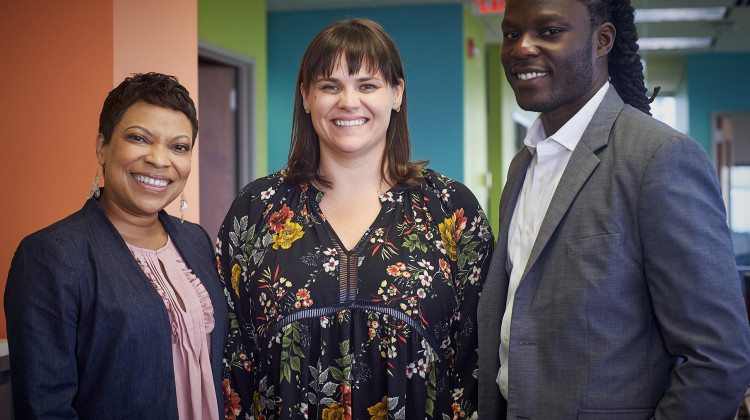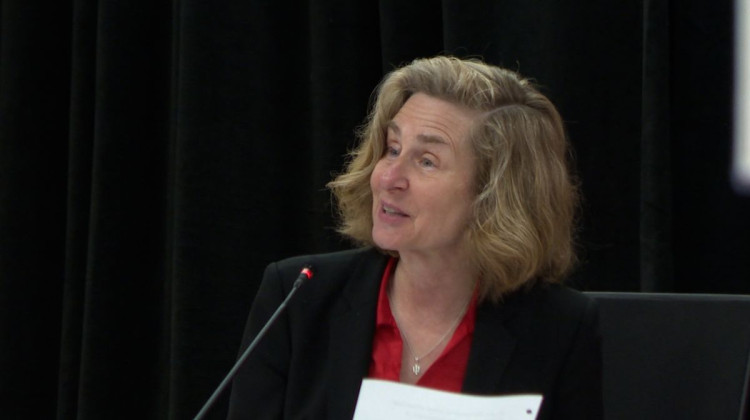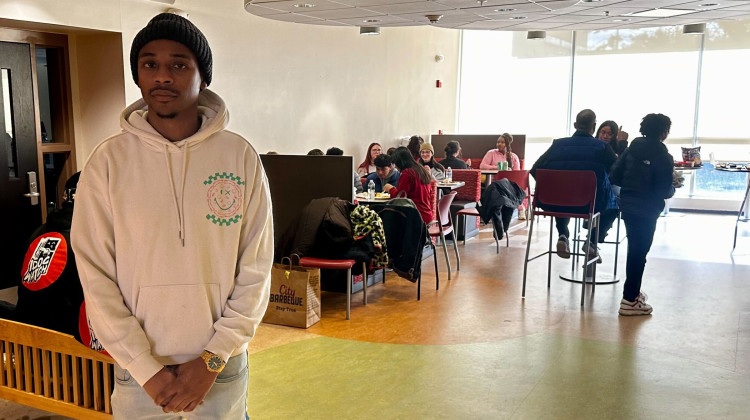
Some of new school design fellows (left to right) Nikki J. Henson, Jenn Watts and Geoffrey Fenelus.
The Mind TrustFor the sixth time, local education reform group The Mind Trust announced today the next group of educators for its school design fellowship. Completion of the one-to-two-year program could result in the Indianapolis Public Schools Board granting the fellow a contract to either start a new school or restart a failing school.
The so-called “innovation schools” are a significant and controversial reform within IPS that was sought by district leaders, the Indianapolis Mayor’s office and The Mind Trust. The schools, when approved by the IPS School Board, have autonomy within the district and are free from many of the policies and union employment contracts. Of the 20 innovation schools created since 2015, most are also charter schools, which includes oversight by the Mayor’s office.
The selected fellows include Geoffrey Fenelus of New York City; and the Indianapolis-based teams of Eddie Rangel and Matthew Rooney; and Jenn Watts and Nikki J. Henson.
Fenelus, who has worked in traditional and charter schools, is interested in restarting a failing district school. He expects to spend up to two-yeas developing a curriculum that combines academics, arts, athletics and character building.
“I like to aim as high as I can, as a leader. And I learned that through working at the different organizations I have,” says Fenelus, whose experience includes time at PAVE Schools and Success Academy Charter Schools in Brooklyn. “The organization I see that is extremely successful is when they aim for something bigger than just being at school.”
Rangel, recently a principal for Tindley Genesis Academy, and Rooney, an Indianapolis native who is the current principal of Democracy Prep Harlem High School in New York City, hope to create an elementary school based around “best practices of high-performing district, district-turnaround, and public charter schools,” according to The Mind Trust.
Watts and Henson, who are part of a The Mind Trust’s charter school fellowship, will seek to open an all-girls, STEM-focused, independent charter school in partnership with Girl Scouts of Central Indiana. Watts most recently served as director of policy for the Indiana Department of Education, and Henson was a recent principal in Pike Township.
The continued approval of the autonomous school was a rallying point for district critics during the 2018 school board election. Even though two skeptics of the model won election, the board recently selected Aleeisa Johnson, a staunch advocate and former IPS director for the reform, as the next district superintendent.
Earlier this year a study from CREDO, the Stanford-based Center for Research on Education Outcomes, found Indianapolis students fell behind their peers statewide, but the city’s charter school and innovation school students showed higher test scores than students in traditional public schools.
The IPS Board has chosen long-failing schools to be restarted as innovation schools, often led by Mind Trust fellows, with new leadership and sometimes new staff. Though earlier this year, school leaders did not recommend any schools be restarted next school year.
While some saw this as the district’s slow-down of innovation schools, Brandon Brown, CEO of The Mind Trust, says that is not the case.
“We feel incredibly confident that the vision to continue to grow the number of high-quality schools and the opportunity to leverage the innovation school pathway as one route to improve schools continues to be a focus of IPS,” Brown says. “And we continue to work very closely with IPS to ensure that we're recruiting and supporting high-quality leaders to go and launch new innovation schools.”
The innovation school fellows are chosen by The Mind Trust and IPS School Board members from a pool of national applicants. Each fellow receives around $200,000 in support per year, to cover salary, health benefits, travel to visit schools, legal assistance, consulting, training and other expenses.
 DONATE
DONATE









 Support WFYI. We can't do it without you.
Support WFYI. We can't do it without you.